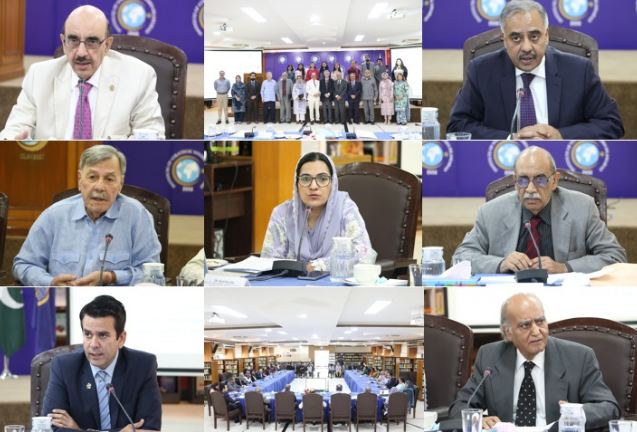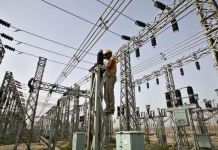ISLAMABAD, JUN 18 /DNA/ – The Institute of Strategic Studies Islamabad (ISSI), in collaboration with the Centre for Law and Security (CLAS), hosted a joint seminar titled “Weaponizing Water: The Indus Waters Treaty and Future of Regional Stability.” The seminar brought together eminent experts, diplomats, legal scholars, and policymakers to discuss the deteriorating regional water security landscape in the aftermath of India’s unilateral and illegal holding of the Indus Waters Treaty (IWT) ‘in abeyance.’ Ambassador Sohail Mahmood, Director General, ISSI delivered welcome remarks. Others speakers included: Ambassador Sardar Masood Khan, President, TMUC, MiTE & Centre for Law and Security (CLAS); Ambassador Shafqat Kakakhel, Member Board of Governors, SDPI; Mr Ashfaq Mahmood, Former Federal Secretary, Ministry of Water and Power; Mr Rehman Azhar, Executive Director, Centre for Law and Security (CLAS); and Dr. Bushra Bibi, Head of Department, Bahria Law School, Bahria University, Islamabad.
Ambassador Sohail Mahmood stated that the weaponization of water is a grave regional threat, particularly following India’s unilateral and illegal step to hold the Indus Waters Treaty (IWT) ‘in abeyance.’ He linked India’s actions to the ideological underpinnings of the BJP-RSS, manifest in the notions of Hindu Rashtra and Akhand Bharat. He described this as part of New Delhi’s so-called ‘muscular’ approach and pan-securitization of the India-Pakistan relationship. He highlighted that India’s blockage of water and construction of several dams in the past years had not only violated the Treaty terms but also affected ecosystems and endangered the lives of millions. His key recommendation was for Pakistan to anchor its response in international law and diplomacy. He urged the government to engage all relevant multilateral forums, mobilize water-stressed nations, and work closely with other regional stakeholders like China and South Asian states having trans-boundary rivers with India. He called for strengthened water governance internally and greater focus on the National Water Policy 2018 for enhanced water security.
Ambassador Masood Khan underlined that India has carefully timed its actions, building a cascade of dams that give it strategic advantage. He warned that Pakistan’s legal position needs to be firmly grounded in international principles. He pointed out potential obstacles in bringing India to arbitration, including provisions in the Vienna Convention and India’s ability to avoid ICJ jurisdiction on issues related to Commonwealth nations. Ambassador Masood recommended Pakistan to apply pressure through the World Bank, the UN Security Council, and key powers like the P5. He called for an assertive international campaign, while also urging Pakistan to maximize domestic water efficiency. Ultimately, Pakistan must choose between maintaining the status quo or pursuing a high-risk, proactive approach to safeguard its water future.
Ambassador Shafqat Kakakhel highlighted the crucial link between Kashmir and water, emphasising that Pakistan’s rivers flow through the disputed region. He reminded that the IWT was not a water-sharing agreement but a river division arrangement heavily influenced by Indian demands. India, he claimed, enjoys uncontested control over the eastern rivers, while seeking to maximize its use of the western ones while ignoring Treaty constraints. Ambassador Kakakhel dismissed the claim that Pakistan opposes all Indian projects and pointed to India’s non-compliance with the Court of Arbitration’s decisions. He recommended activating Article IX of the Treaty to initiate formal dispute resolution and appropriately raising the issue in the UN Security Council. He emphasized preserving the IWT as a legal shield for Pakistan’s water security and promoting sustained international diplomacy.
Mr. Ashfaq Mahmood focused on the strategic objectives behind India’s moves, arguing that India seeks to both hegemonize water and prevent third-party involvement by insisting on bilateralism. He underscored the dangerous narrative linking terrorism with water rights. Mr Ashfaq recommended a stronger legal posture from Pakistan, including strict enforcement of the IWT and referral to the Court of Arbitration. He called for improved water data collection, climate-related research, and internal technical preparedness. Most importantly, he urged Pakistan to compel India to be transparent about the demographic and climate factors it cites and to push for structured dialogue.
Mr Rehman Azhar viewed India’s actions as part of a broader domestic political strategy, likening the suspension of the IWT to the revocation of Articles 370 and 35A. He argued that water-related rhetoric and actions of the BJP serve its domestic electoral purposes. He noted that legal and military options are limited, and called for a robust media and diplomatic campaign to expose India’s unilateralism. Mr Rehman recommended framing India’s actions as violations of international norms, linking the issue to environmental and nuclear risks, and involving global actors like China and the U.S. He emphasized the need for an immediate and louder response to raise global awareness and pressure.
Dr. Bushra Bibi warned that future wars will likely be fought over water, as only 0.3% of the world’s surface water is usable. She characterized India’s suspension of the IWT as a form of “environmental terrorism” and highlighted the growing risks of drought and floods in Pakistan. She recommended fighting Pakistan’s case internationally by engaging global water and environmental organizations, building collaboration with China and Afghanistan, and exploring the legal recognition of rivers as ‘persons’—a concept that would offer enhanced environmental protection and global attention to the issue.
The panellists’ presentations were followed by a wide-ranging question-and-comments session.
In his closing remarks, Ambassador Khalid Mahmood recalled the World Bank’s recent stance that the Treaty is not subject to alteration unilaterally. He also highlighted the growing challenges posed by climate change and increasing pressure on water resources. He emphasized that the emerging issues cannot be overlooked—and the central challenge now is finding effective ways to address them within the existing framework.
















